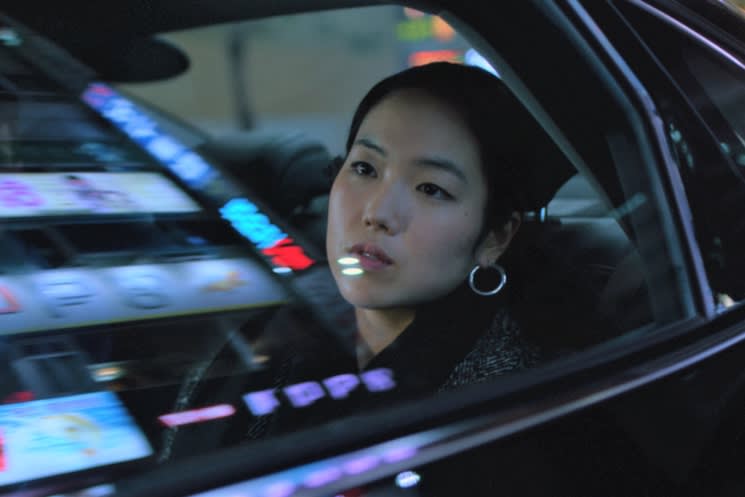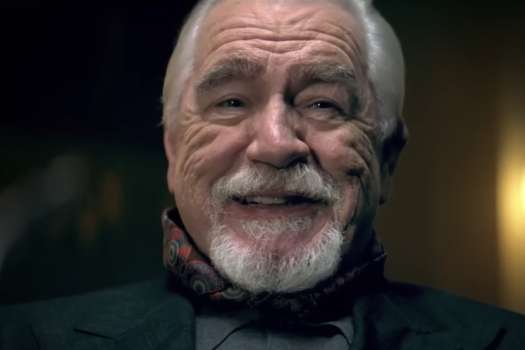Davy Chou's Return to Seoul dazzles with a melancholic and disconcerting portrayal of one reality of being an adoptee. When Freddie Benoît (Park Ji-Min) visits her birth country, South Korea, for the first time, she shows up seemingly without any plans other than to have a good time. Freddie enjoys and seeks out chaos, especially in a city and culture that is almost entirely new to her. But after she reconnects with her biological father, she begins a years-long journey of self-discovery that transpires across several visits to Seoul and uproots her sense of belonging.
We first meet Freddie drinking soju at a bar with friends she has just made in a hostel. After she's asked if she wants to find her biological parents there, she dismisses the topic with her own playful question: "Do you know what sight reading is?" In answering this herself, Freddie encapsulates her approach to life and her return to Seoul: it's learning how to read the signs and leaping towards them to "catch them as they appear."
While in Seoul, Freddie aimlessly throws herself into experiences if only for the sake of feeling something. Even after she decides to reconnect with her biological father, she grows frustrated with his constant messaging and comes to resent the traditional Korean gender norms being applied to her. Resistance and yearning play tug of war throughout the film, and Freddie is suspended between them at every chapter of her life we witness.
Initially, it feels as though Freddie finds herself in South Korea by chance or on an impulse, but there's an underlying gravity that keeps pulling her to her roots and family. Each time she returns to Seoul, we meet a very different version of Freddie. Most of the film depicts her first visit and her reunion with her biological father, followed later by visits marked by failed attempts at connecting with her biological mother.
Chou paints a stunning backdrop around Freddie's journey in a moody, dream-like Seoul, and Thomas Favel's cinematography is consistently gorgeous. Some earlier scenes, such as Freddie's visits to the adoption agency and her father's hometown, are shot in the sobering daylight, reflecting her stark confrontation of these vividly new and often uncomfortable moments. Much of the film, though, takes place at night amid bright neon lights as Freddie shifts, visually and characteristically, to fit the grungier side of the city. Throughout the film, the camerawork invites the audience to feel alongside her.
In an impressive acting debut, French-Korean artist Park gives a striking performance. She embodies the discomfort and apprehension Freddie feels throughout her reunion with her biological family with delicate care, and effortlessly adapts to each contrasting stage of Freddie's life. Moments of the film border on the surreal, mirroring the disorientation Freddie feels in these unfamiliar yet intimate situations as she reconnects with her family. Park's muted approach to the character and subdued observations as Freddie create a raw and convincing narrative. This is especially apparent in one unnerving scene, when viewers feel Freddie's tense restraint as her biological grandmother sobs with shame and longing, grasping desperately at Freddie's hair as they sleep next to each other on the floor.
Composers Jérémie Arcache and Christophe Musset create a soundtrack emphasizing the curiosity and despair Freddie experiences throughout her unexpected journey. Whether it's Freddie's attempt to hear the muffled tunes playing from another hostel room or her pained eyes as her biological father plays a devastating keyboard composition, illustrating the progress in their relationship, music plays a key role in revealing how Freddie feels throughout the film.
In Return to Seoul, Chou shares a familiar narrative about identity, but with a unique angle. We witness chapters of Freddie's life and all of their differences, strung together with disorder rather than progress. There is a constant sense that she is lost again and again in spite of learning the language, integrating with the culture or accepting a place in her biological family. This is what makes the film so memorable — there's no end to Freddie's search, and Chou basks in the undeniable beauty in this reality.
(Mongrel Media)We first meet Freddie drinking soju at a bar with friends she has just made in a hostel. After she's asked if she wants to find her biological parents there, she dismisses the topic with her own playful question: "Do you know what sight reading is?" In answering this herself, Freddie encapsulates her approach to life and her return to Seoul: it's learning how to read the signs and leaping towards them to "catch them as they appear."
While in Seoul, Freddie aimlessly throws herself into experiences if only for the sake of feeling something. Even after she decides to reconnect with her biological father, she grows frustrated with his constant messaging and comes to resent the traditional Korean gender norms being applied to her. Resistance and yearning play tug of war throughout the film, and Freddie is suspended between them at every chapter of her life we witness.
Initially, it feels as though Freddie finds herself in South Korea by chance or on an impulse, but there's an underlying gravity that keeps pulling her to her roots and family. Each time she returns to Seoul, we meet a very different version of Freddie. Most of the film depicts her first visit and her reunion with her biological father, followed later by visits marked by failed attempts at connecting with her biological mother.
Chou paints a stunning backdrop around Freddie's journey in a moody, dream-like Seoul, and Thomas Favel's cinematography is consistently gorgeous. Some earlier scenes, such as Freddie's visits to the adoption agency and her father's hometown, are shot in the sobering daylight, reflecting her stark confrontation of these vividly new and often uncomfortable moments. Much of the film, though, takes place at night amid bright neon lights as Freddie shifts, visually and characteristically, to fit the grungier side of the city. Throughout the film, the camerawork invites the audience to feel alongside her.
In an impressive acting debut, French-Korean artist Park gives a striking performance. She embodies the discomfort and apprehension Freddie feels throughout her reunion with her biological family with delicate care, and effortlessly adapts to each contrasting stage of Freddie's life. Moments of the film border on the surreal, mirroring the disorientation Freddie feels in these unfamiliar yet intimate situations as she reconnects with her family. Park's muted approach to the character and subdued observations as Freddie create a raw and convincing narrative. This is especially apparent in one unnerving scene, when viewers feel Freddie's tense restraint as her biological grandmother sobs with shame and longing, grasping desperately at Freddie's hair as they sleep next to each other on the floor.
Composers Jérémie Arcache and Christophe Musset create a soundtrack emphasizing the curiosity and despair Freddie experiences throughout her unexpected journey. Whether it's Freddie's attempt to hear the muffled tunes playing from another hostel room or her pained eyes as her biological father plays a devastating keyboard composition, illustrating the progress in their relationship, music plays a key role in revealing how Freddie feels throughout the film.
In Return to Seoul, Chou shares a familiar narrative about identity, but with a unique angle. We witness chapters of Freddie's life and all of their differences, strung together with disorder rather than progress. There is a constant sense that she is lost again and again in spite of learning the language, integrating with the culture or accepting a place in her biological family. This is what makes the film so memorable — there's no end to Freddie's search, and Chou basks in the undeniable beauty in this reality.




